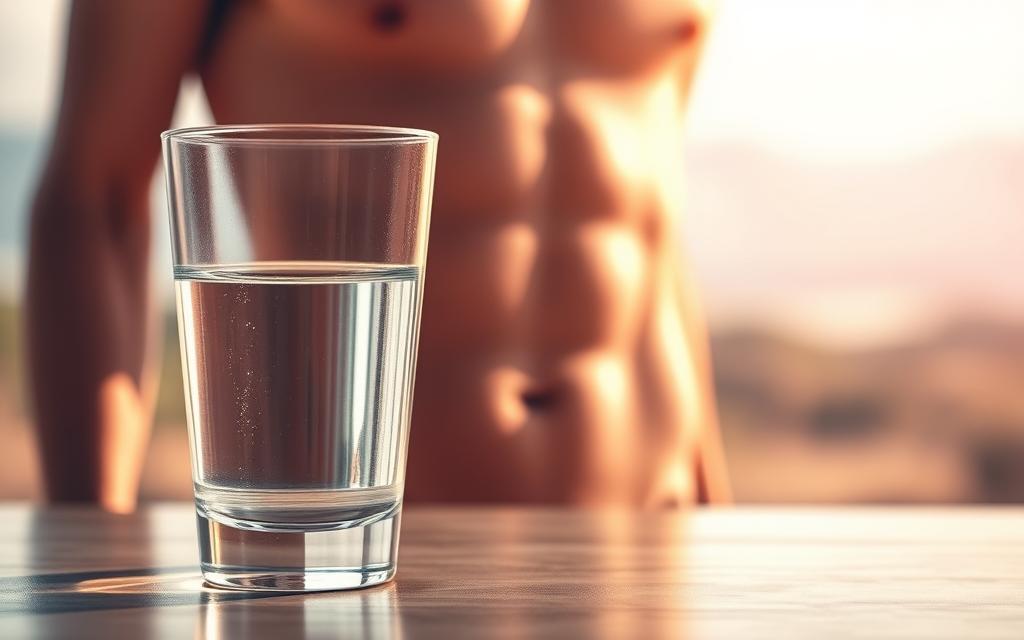Does Drinking Water Help with Erectile Dysfunction? | Hydration & ED Connection Explained
Hydration plays a crucial role in various bodily functions, including aspects related to men’s health such as erectile dysfunction (ED).
Drinking enough water is essential for maintaining overall health, and there’s growing interest in its potential impact on ED. Dehydration can lead to decreased blood volume, which might affect erectile function.
This article explores the connection between hydration and ED, examining how adequate water intake can influence erectile health. We’ll delve into the latest insights and research findings to provide a comprehensive understanding.
The Relationship Between Hydration and Sexual Health
The intricate relationship between hydration and sexual health is rooted in how water influences blood flow and circulation. Adequate hydration is essential for maintaining healthy blood vessels and ensuring proper circulation, both of which are critical for sexual function.
How Water Affects Blood Flow and Circulation
Water intake plays a significant role in blood flow and circulation. Even mild dehydration can cause a decrease in blood volume, leading to reduced blood flow. This reduction can affect erectile function, as the penis requires adequate blood flow to achieve and maintain an erection. Drinking enough water helps maintain blood vessel flexibility and promotes healthy circulation, which is vital for sexual health.
Dehydration’s Impact on Erectile Function
Dehydration can significantly impact erectile function. When the body is dehydrated, it prioritizes water distribution to vital organs over other functions, including sexual arousal. This can lead to decreased libido and erectile dysfunction. Rehydrating the body can help restore normal sexual function, emphasizing the importance of adequate hydration for sexual health.
Can Weight Gain Cause Erectile Dysfunction?
The relationship between weight gain and erectile dysfunction (ED) is complex and multifaceted, involving various physiological and hormonal changes. To understand how weight gain can lead to ED, it’s essential to explore the underlying mechanisms.
The Science Behind Weight and ED
Research has shown that excess weight, particularly around the abdominal area, can lead to erectile dysfunction. This is because excess body fat is linked to inflammation and vascular dysfunction, making it harder for men to achieve and maintain an erection. Key factors include:
- Insulin resistance and metabolic syndrome
- Increased inflammation and oxidative stress
- Damage to blood vessels and endothelial dysfunction
How Excess Weight Affects Hormones
Excess weight can significantly impact hormone levels, including testosterone and estrogen. When body fat increases, it can lead to a decrease in testosterone production, which is crucial for sexual function. Moreover, excess fat can cause an imbalance between testosterone and estrogen, further contributing to ED.

The Connection Between Hydration and Weight Management
Proper hydration plays a crucial role in weight management and overall health. Even mild dehydration can lead to a decrease in metabolic rate, making it harder to lose weight. Furthermore, hydration helps control hunger and boosts energy levels, making it easier to stick to a healthy diet and exercise regimen. Key hydration tips include:
- Drinking at least eight glasses of water per day
- Incorporating hydrating foods into your diet
- Avoiding sugary drinks that can lead to dehydration
By understanding the interplay between weight gain, hormonal balance, and hydration, individuals can take proactive steps towards managing their weight and reducing the risk of erectile dysfunction.
The Physiological Mechanisms of Hydration and ED
The relationship between hydration and erectile dysfunction is multifaceted, involving factors such as hormone production, vascular health, and dehydration’s effects on the body. Adequate hydration is essential for maintaining the delicate balance of bodily functions that support erectile function.
Water’s Role in Hormone Production
Water plays a crucial role in hormone production, including testosterone, which is vital for sexual health. Even mild dehydration can disrupt hormone levels, potentially leading to issues with erectile function. Proper hydration ensures that the endocrine system functions correctly, supporting the production of hormones necessary for sexual arousal and performance.
Hydration and Vascular Health
Vascular health is another critical aspect of erectile function, as it directly affects blood flow to the penis. Hydration helps maintain blood vessel elasticity and promotes healthy circulation. Dehydration can lead to decreased blood volume, causing a reduction in blood pressure and potentially impairing erectile function.
How Dehydration Triggers ED Symptoms
Dehydration can trigger a cascade of physiological responses that contribute to ED symptoms. When the body is dehydrated, it prioritizes water distribution to vital organs, potentially reducing blood flow to the penis. This reduction in blood flow, combined with the potential for decreased testosterone production, can exacerbate ED symptoms.
Optimal Water Intake for Men’s Sexual Health
The connection between water intake and men’s sexual health is more profound than one might initially think. Adequate hydration is essential for maintaining various bodily functions that directly impact sexual well-being.
Recommended Daily Water Consumption
Understanding the right amount of water to drink daily is crucial. The general recommendation is to consume at least eight 8-ounce glasses of water per day, known as the 8×8 rule. However, individual needs may vary based on factors such as age, activity level, and climate.
Factors Influencing Water Needs
- Activity level: More active individuals may need more water.
- Climate: Hot and humid climates may require increased hydration.
- Age: Older adults might need to drink more water due to decreased thirst sensation.
Signs of Dehydration to Watch For
Dehydration can significantly impact sexual health. Common signs include:
- Dry mouth and throat
- Fatigue and dizziness
- Dark urine
Recognizing these signs early can help in taking corrective measures to stay hydrated.
Creating a Hydration Schedule
To ensure adequate hydration, creating a schedule can be helpful. Here are some tips:
| Time | Hydration Tip |
|---|---|
| Upon waking | Drink a glass of water |
| Before meals | Have a glass of water |
| Before bed | Avoid excessive water to prevent nocturia |
By following these guidelines and being mindful of hydration, men can support their sexual health and overall well-being.
Beyond Water: Other Hydration Sources That Support Erectile Function
In addition to drinking water, other hydration sources can significantly impact erectile function and overall sexual health. While water is essential for hydration, a balanced diet and other beverages also play crucial roles in maintaining optimal erectile function.
Hydrating Foods and Their Benefits
Incorporating hydrating foods into your diet can support erectile health. Foods with high water content, such as watermelon, cucumbers, and celery, contribute to overall hydration. These foods are not only refreshing but also rich in nutrients and antioxidants that promote vascular health, which is essential for erectile function. For more information on how diet impacts erectile health, visit Colorado Urologists for expert advice.
Beverages to Embrace for Better Sexual Health
Certain beverages can enhance sexual health by improving hydration and vascular function. Green tea, rich in antioxidants, and beet juice, which improves blood flow, are excellent choices. Additionally, consuming low-fat milk and fruit smoothies can contribute to overall hydration and provide essential nutrients that support erectile health.
Drinks to Limit or Avoid
While some beverages can support erectile health, others can hinder it. It’s advisable to limit or avoid sugary drinks and alcohol, as they can lead to dehydration and negatively impact erectile function. Caffeine, when consumed excessively, can also act as a diuretic, potentially worsening dehydration.
Lifestyle Changes That Complement Proper Hydration
In addition to staying hydrated, several lifestyle adjustments can help alleviate erectile dysfunction symptoms. Maintaining a healthy lifestyle is not just about drinking enough water; it’s also about incorporating habits that support overall well-being.

Exercise Routines That Improve Circulation
Regular physical activity is essential for improving blood circulation, which is vital for erectile function. Aim for at least 30 minutes of moderate-intensity exercise most days of the week. Activities like brisk walking, cycling, or swimming can help enhance cardiovascular health and reduce the risk of erectile dysfunction.
Stress Management Techniques
High levels of stress can negatively impact erectile function. Stress management techniques such as meditation, deep breathing exercises, or yoga can help mitigate this effect. By incorporating these practices into your daily routine, you can better manage stress and improve your overall sexual health.
When to Consult a Healthcare Provider About ED
If you’re experiencing persistent erectile dysfunction, it’s crucial to consult a healthcare provider. They can help identify underlying causes and recommend appropriate treatments. Don’t hesitate to seek professional advice if lifestyle changes and proper hydration don’t lead to improvements in your symptoms.
By combining proper hydration with these lifestyle changes, you can take a comprehensive approach to managing erectile dysfunction and improving your overall health.
Conclusion: Integrating Hydration Into Your ED Management Plan
Proper hydration plays a crucial role in maintaining overall sexual health and managing erectile dysfunction. By understanding the connection between hydration and ED, individuals can take a proactive approach to improving their condition.
Incorporating adequate hydration into daily life can be achieved by drinking the recommended amount of water, consuming hydrating foods, and limiting dehydrating beverages. A well-hydrated body supports healthy blood flow, hormone production, and vascular health, all of which are essential for optimal erectile function.
Combining proper hydration with other lifestyle changes, such as regular exercise and stress management, can further enhance ED management. It’s essential to consult with a healthcare provider to develop a comprehensive plan tailored to individual needs.
By prioritizing hydration and adopting a holistic approach to health, individuals can better manage erectile dysfunction and improve their overall well-being.
